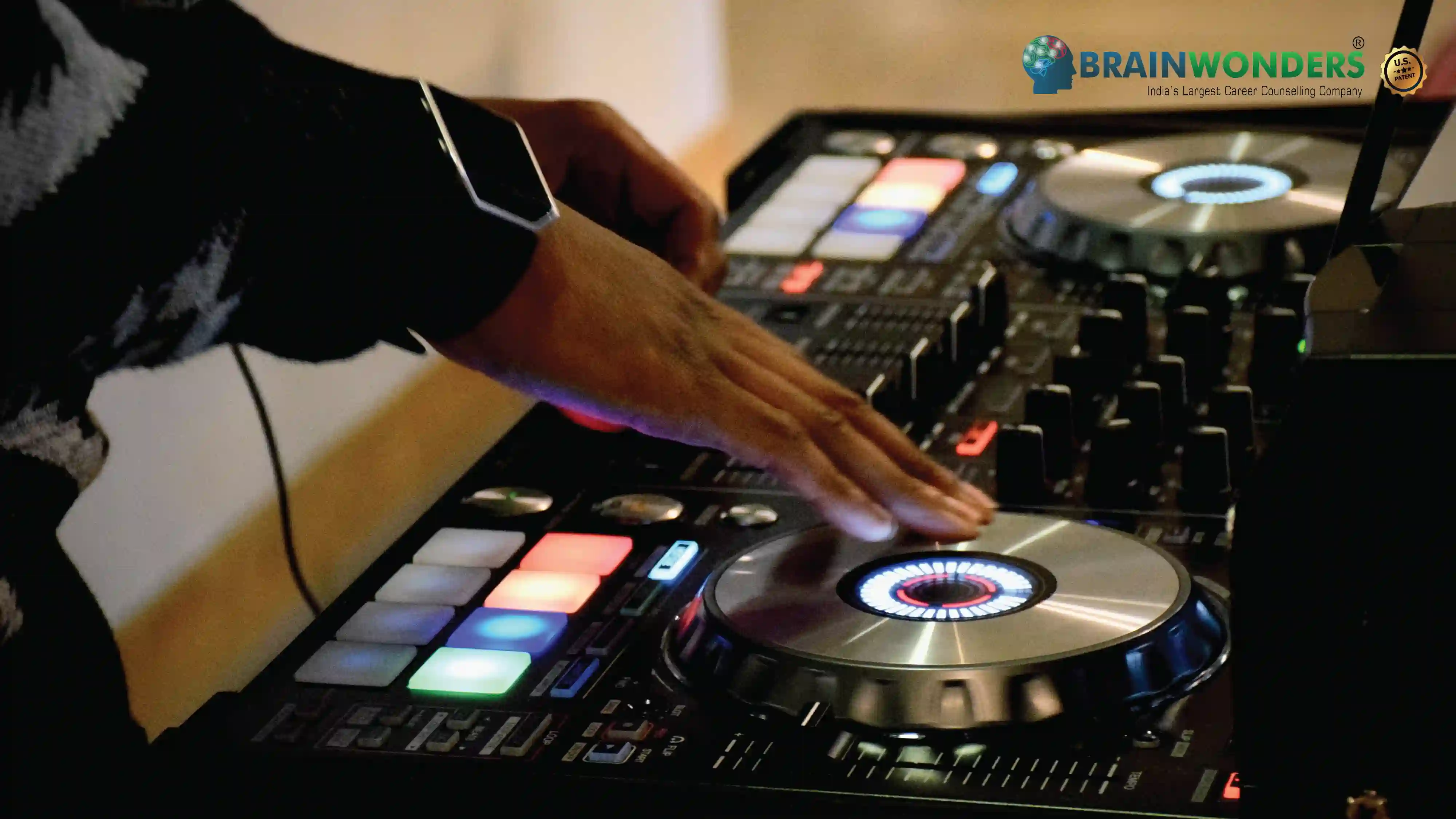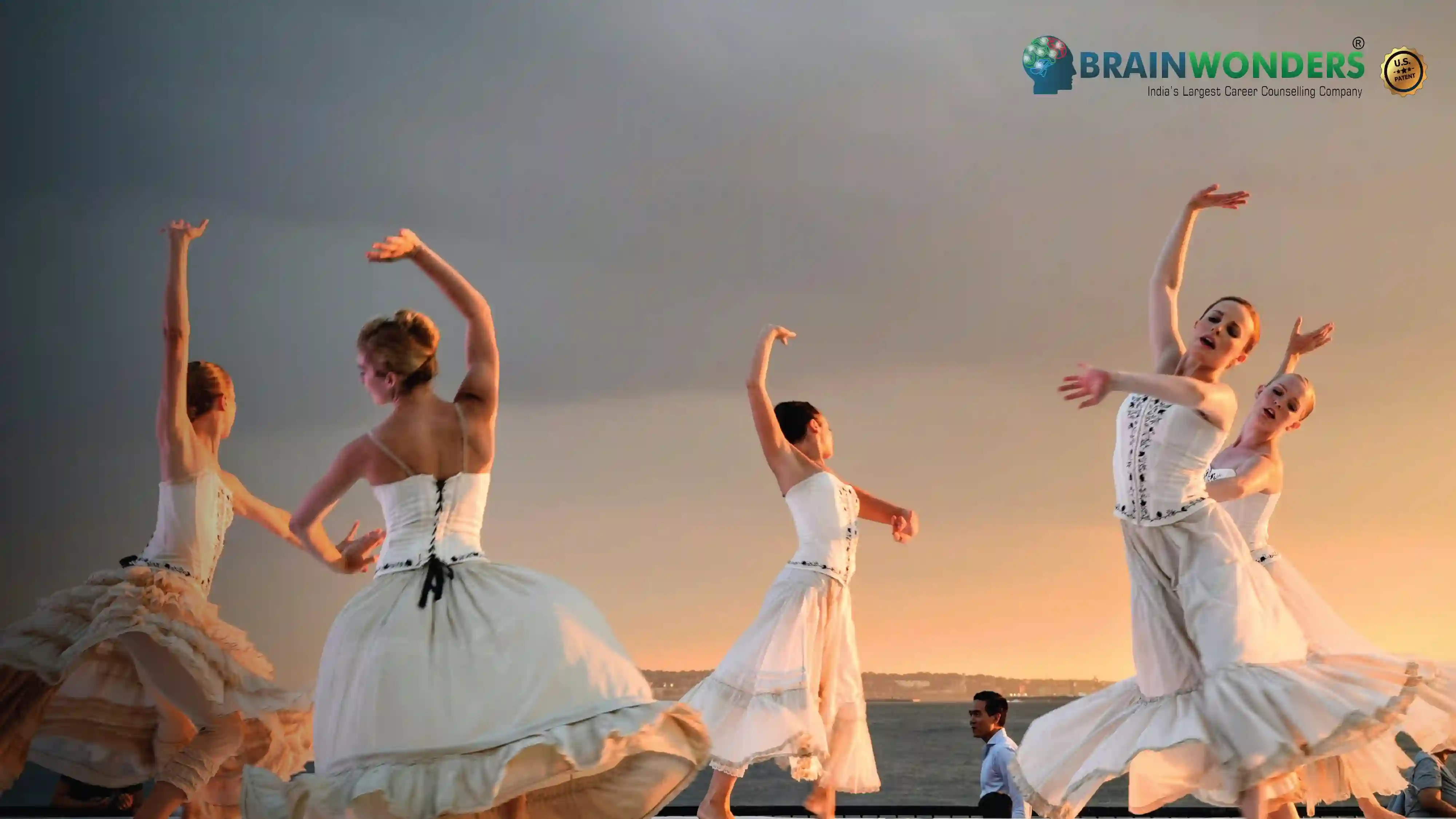How to become a Disc Jockey
Overview, Courses, Exam, Colleges, Pathways, Salary

Overview
Who is Disc Jockey ?
A disc jockey usually referred to as a DJ, is a person who prepares and plays recorded music for an audience. Each of their works focuses on a specific type of music, such as jazz, R&B, country music, Rock and Roll (including metal), Bollywood, etc. In addition, they often produce fresh arrangements of the previously created tunes in order to ensure that the audience is always on its feet, dancing and enjoying the rhythms throughout the performance. Radio stations and even music broadcasts often hire DJs to reach the most significant number of people possible via advertising and entertainment sectors. They are also often very interested in pop culture, sports, and politics, among other things. DJs are usually required to work till the week hours in the morning since their work environment includes parties, clubs, events, weddings, and other nighttime gatherings.
Typical day at work
What does Disc Jockey do?
- Combine genres and tracks with the help of equipment such as turntables, mixers, graphic equalisers, tape decks and other sound processers
- Ensure that program is running smoothly and is on air based on time limits
- Hold various radio contests, question callers, and take interviews
- Take song requests from the listeners and audience
- Provide updates on the weather forecast and traffic jams in the areas
- Supply music and sound system services at events
- Select tracks to be played based on target audience’s taste and venue policy
- Play and mix records to create atmosphere and keep audience dancing
- Operate lighting and visual effects in time to the beat
- Develop new sounds by manipulating beats, using samples, additional music, and sound effects
- Collaborate with an MC who raps or sings over the music
- Operate studio equipment and software to play music, pre-recorded news, jingles and advertisements
- Formulate scripts and develop playlists for shows
Abilities and Aptitude needed
What are the skills, abilities & aptitude needed to become Disc Jockey?
It is essential for a DJ to feel comfortable and confident while playing in front of an audience. Consequently, they must also have social perceptiveness abilities to be aware of and comprehend the emotions of their audience members. In addition, auditory awareness and attention are required to distinguish between sounds that change in pitch and volume and maintain concentration on a single source of sound in the face of distracting noises.
Manual and finger dexterity is another vital talent to have, and it refers to the ability to move your hands and fingers in a coordinated manner with your fingers. To recall each song's voice, melody, and rhythm, one must also have memorising solid abilities. They must also be well-versed in current worldwide music trends and the capacity to develop their music, tracks, and lyrics. DJs must also be able to communicate, comprehend, and generate new ideas to be successful. They must be able to think rapidly and creatively and exercise sound judgment and decision-making abilities to come up with the appropriate melody, instrument, and lyrics for a specific composition. Promoters, talent buyers, and other DJs for possible job and partnership opportunities and knowledge of social media platforms are essential for building a fan base. Finally, to keep up with the commitments of live performances, it is vital to have a lot of passion as well as a certain level of technical ability.
Salary
Salary for Disc Jockey?
The salary of a Digital Marketing Manager can vary based on factors such as experience, location, level of education, size of the organization, and the industry in which they work.
- Minimum Monthly Salary: The monthly salary can be from INR 30,000 to INR 50,000.
- Maximum Monthly Salary: The monthly salary can be from INR 1,00,000 to INR 2,50,000 or more.
- Annual Salary: The salary can be from INR 3,60,000 to INR 30,00,000 or more.
- Highest Paying Job and Scope:The highest paying job for a Digital Marketing Manager is often in large organizations or multinational companies with extensive digital marketing operations. Those with several years of experience and a track record of successful campaigns can command higher salaries.The scope for Digital Marketing Managers is promising as businesses across industries increasingly rely on digital channels to reach their target audiences. Digital Marketing Managers are responsible for planning, executing, and optimizing digital marketing strategies, including SEO, social media, content marketing, email marketing, paid advertising, and analytics.
Pathways
How to become an Disc Jockey?
Entrance Exam
Entrance Exam for Disc Jockey ?
Radio/FM channel DJs, also known as Radio Jockeys (RJs), and Club DJs, who play for a live audience at events to produce music and amuse the crowd, are the two types of DJs. In addition, Internet radio stations, private bookings for weddings and parties, mobile disc jockey services, local pubs and dance clubs, and genre-based television channels are some of the various career prospects in the music business.
In India, no institutions or schools provide specialist DJ courses or conduct training programmes with a set syllabus and curriculum connected to DJing. However, specific training centres and private institutions worldwide provide the necessary skill set, training, and development programmes. Chennai, Bangalore, Mumbai, Gurugram, Noida, Delhi, Kolkata, and Hyderabad are India's leading DJ training, development, and private institutes. Short-term courses in Disc Jockey training and development are available at the training centres. Candidates who complete the Disc Jockey course will have options in a variety of professions. As a newcomer, applicants will face stiff market competition since their careers depend on their reputation and networks in many social sectors and event planning businesses.
The following are the primary career opportunities for a disc jockey:
Self-employment: Disc jockeys may work part-time or on a casual basis in various clubs and public locations that demand live music. They may work many sessions at various locations and events and be paid on an hourly basis.
Full-Time Job: DJs may work full-time in radio stations, nightclubs, and other public entertainment venues. Disc jockeys may work part-time in the jobs that are available to them.
Contract-based work with agencies: The DJ may work on a contract basis with various agents and event managers for live performances at various events. They may also get contract employment at other clubs and pubs through networks and agencies.
Part-time employment at a media house: Through agents and job contractors, they may work in the local press, national press, and industry websites. DJs are compensated according to their work for media publishing firms in these occupations. They are given goals to work toward, and they are compensated based on those goals.
Courses
Which course I can pursue?
Best Colleges
Which are the best colleges to attend to become an Disc Jockey?
Industries
Which Industries are open for Disc Jockey?
Disc Jockeys (DJs) have diverse opportunities to showcase their skills and entertain audiences in various industries and settings. DJs are sought after in places where music plays a significant role in creating an ambiance and enhancing the overall experience. Here are some industries open for DJs:
- Nightclubs and Bars: DJs are a staple in nightclubs and bars, providing music to dance and partygoers.
- Music Festivals and Concerts: DJs are featured artists in music festivals and concerts, performing for large crowds.
- Weddings and Private Events: DJs entertain guests at weddings, birthdays, corporate parties, and other private events.
- Radio and Online Radio Stations: DJs host music shows on traditional radio stations and online radio platforms.
- Cruise Ships and Resorts: DJs entertain passengers and guests on cruise ships and at resorts.
- Hotels and Hospitality: DJs perform at hotels and resorts, enhancing guest experiences in lounges, pool areas, and special events.
- Event Management Companies: DJs are hired by event management companies for various events, including product launches, fashion shows, and exhibitions.
- Music Production and Recording: Some DJs venture into music production and recording, creating original tracks and remixes.
- Restaurants and Cafes: DJs provide background music at restaurants and cafes to create a pleasant dining atmosphere.
- Fitness Studios and Gyms: DJs curate music playlists for fitness classes and workout sessions.
- Fashion Shows and Runways: DJs set the tone and energy for fashion shows and runways.
- Online Streaming Platforms and Social Media: DJs engage with audiences through live streaming sessions and mixtapes on Twitch, YouTube, and Instagram.
- Branded Events and Activations: Brands may hire DJs for promotional events and activations to attract audiences.
- Music Production Companies and Studios: DJs collaborate with music production companies and studios to create music for commercials, movies, and TV shows.
- Virtual Events and Conferences: DJs perform at virtual events and conferences, providing entertainment to online audiences.
internship
Are there internships available for Disc Jockey?
Internships for Disc Jockeys, commonly known as DJs, are a valuable opportunity for aspiring DJs to gain hands-on experience and enhance their skills in music and entertainment. While formal DJ internships may not be as prevalent as in some other fields, there are still several ways DJs can seek internship-like experiences:
- Nightclubs and Bars: Many nightclubs and bars hire DJs for regular performances. Aspiring DJs can approach these venues to inquire about opportunities to shadow experienced DJs or perform during less busy hours.
- Event Management Companies: Event management companies often require DJs for various events, such as parties, weddings, and corporate functions. DJs can contact these companies to offer their services as interns for event setups and performances.
- Music Festivals and Concerts: Some music festivals and concerts may allow emerging DJs to participate in their lineup or perform on smaller stages.
- Radio Stations: Local radio stations that feature DJ-hosted shows may offer internships for aspiring DJs to learn about radio programming, mixing music, and operating broadcast equipment.
- DJ Equipment Retailers: Stores that sell DJ equipment and gear may offer internship-like opportunities for aspiring DJs to demonstrate products, conduct workshops, and gain exposure to the DJing community.
- Online Platforms and Radio Stations: Internet radio stations and online music platforms may accept DJ mixes from aspiring DJs, providing a platform to showcase their skills to a wider audience.
- Networking Events and DJ Workshops: Attending networking events and workshops can help aspiring DJs connect with experienced professionals, learn about the industry, and discover potential internship opportunities.
- Collaborations with Established DJs: Aspiring DJs can contact established DJs for possible collaborations, opening doors to performances and mentorship opportunities.
Career outlook
What does the future look like for Disc Jockey?
Radio/FM channel DJs, also known as Radio Jockeys (RJs), and Club DJs, who play for a live audience at events to produce music and amuse the crowd, are the two types of DJs. Internet radio stations, private bookings for weddings and parties, mobile disc jockey services, local pubs and dance clubs, and genre-based television channels are some of the various career prospects in the music business.
In India, there are no institutions or schools that provide specialist DJ courses or conduct training programmes with a set syllabus and curriculum connected to DJing. However, certain training centres and private institutions across the world provide the necessary skill set, training, and development programmes. Chennai, Bangalore, Mumbai, Gurugram, Noida, Delhi, Kolkata, and Hyderabad are the main DJ training, development, and private institutes in India. Short-term courses in Disc Jockey training and development are available at the training centres. Candidates who complete the Disc Jockey course will have options in a variety of professions. As a newcomer, applicants will face stiff market competition since their career is dependent on their reputation and networks in many social sectors and event planning businesses. The following are the primary career opportunities for a disc jockey:
Self-employment: Disc jockeys may work part-time or on a casual basis in a variety of clubs and public locations that demand live music. They may work many sessions at various locations and events and be paid on an hourly basis.
Full-Time Job: DJs may work full-time in radio stations, nightclubs, and other public entertainment venues. Disc jockeys may work part-time in the jobs that are available to them.
Contract-based work with agencies: The DJ may work on a contract basis with various agents and event managers for live performances at various events. Through networks and agencies, they may also get contract employment at other clubs and pubs.
Part-time employment at a media house: Through agents and job contractors, they may get work in the local press, national press, and industry websites. DJs are compensated according to the work they do for media publishing firms in these occupations. They are given goals to work toward, and they are compensated based on those goals.
.webp)


